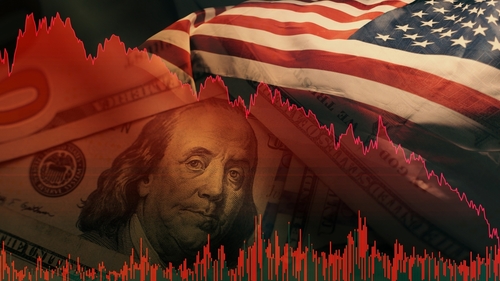
The United States economy, while seemingly robust on the surface, is facing an imminent threat that could undermine its stability and future growth. Renowned hedge fund manager Paul Tudor Jones has sounded the alarm on what he describes as a ‘debt bomb’—a looming crisis precipitated by unsustainable government borrowing.
Despite the appearance of strength, the U.S. economy is essentially operating on ‘steroids,’ with artificial boosts masking significant underlying issues such as soaring national debt. The current federal debt has skyrocketed to a historic $34 trillion, translating to over $100,000 per American citizen. This staggering figure is a clear indicator of fiscal irresponsibility and a harbinger of potential economic turmoil.
PAUL TUDOR JONES PREDICTS A BIG EXPLOSION FROM THE DEBT BOMB. WE ARE WAITING. pic.twitter.com/nfZKK1gCWj
— XPi 🧧⚡ 𝜋 (@PiiFiatAlert) February 8, 2024
Jones’s observations are not isolated. They resonate with concerns previously expressed by Federal Reserve Chair Jerome Powell, who highlighted the alarming pace at which the national debt is outpacing the economy. Powell’s call for lawmakers to steer the nation back onto a sustainable fiscal path underscores the urgency of the situation.
The last quarter of the previous year saw the U.S. economy grow by 3.3 percent annually, surpassing expectations and showcasing the resilience of consumers and businesses amidst high-interest rates.
'Paul Tudor Jones said two big macro themes — "the debt bomb" in the U.S. and the rise of AI — are clashing with each other.' pic.twitter.com/ZRZWVNCU7N
— Win Smart, CFA (@WinfieldSmart) February 8, 2024
However, this growth comes at a cost. The federal deficit doubled last year to $1.7 trillion, and interest payments on the national debt now exceed $1.8 billion daily. Such expenditures threaten the economic future of the country and risk further exacerbating the deficit.
Experts warn that the burgeoning debt could exert additional pressure on inflation, maintain high-interest rates, and increase the cost of borrowing for households. This could have far-reaching consequences, potentially affecting critical programs like Social Security and Medicare. Fiscal watchdogs have described the current level of debt as perilous for both the economy and national security.
Compounding the issue is the record-high household debt, which surged by $212 billion in the last quarter, reaching an unprecedented $17.5 trillion. The rise in delinquencies during the same period paints a grim picture of the financial strain on American families, exacerbated by inflation, increased interest rates, and the resumption of student loan repayments.
The stark reality is that the U.S. economy is at a crossroads. Without immediate and decisive action to address the spiraling debt and its underlying causes, the nation risks triggering a financial catastrophe that could undo years of economic progress. It is imperative for policymakers to heed the warnings of financial experts like Paul Tudor Jones and take steps to defuse the ‘debt bomb’ before it detonates, jeopardizing the prosperity and security of future generations.











